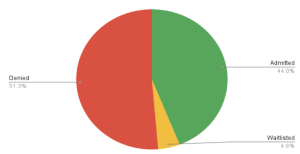President Trump threatens more tariffs on Chinese goods
May 9, 2019
President Donald Trump threatened on Sunday to impose more tariffs on Chinese goods in an attempt to force additional concessions in a final agreement; the strong American economy might have encouraged his actions.
Trump, in a tweet, warned that he would increase tariffs on $200 billion in Chinese goods at the end of this week and “shortly” impose levies on hundreds of billions of dollars of additional imports.
High-level Chinese officials are arriving in Washington this week for what is expected to be the final round of negotiations. Trump’s threat was a surprise for Chinese officials. Trump’s tweets come after Chinese officials took a tough line in high-level trade negotiations last week in Beijing, two of the people said.
Chinese negotiators said they were reluctant to make any agreement that would require China’s legislature to approve changes to current law. The legislature in March already approved a new foreign investment law that added protections for foreign companies who fear they will be forced to transfer their technology and know-how to Chinese firms.
Trump’s tweet fit a familiar pattern. He has routinely turned to tariffs to help speed negotiations and.
The president has already hit Mexico, Canada, Europe and Japan with steel and aluminum tariffs and threatened to impose auto tariffs if they do not accept his demands on trade and other matters.
It remains unclear whether Trump’s threat will produce a beneficial trade agreement for the United States or whether it will backfire by pushing already tense relations past the breaking point. While the United States believes it has leverage over China, huge swaths of the American economy depend on access to the Chinese market for materials, products and sales.
Stock markets have recovered on expectations of an agreement and the Federal Reserve Chairman Jerome H. Powell, at a meeting last week, cited “reports of progress in the trade talks between the United States and China.”
Treasury Secretary Steven Mnuchin, who made a quick trip to Beijing last week, has expressed optimism about the trade talk. But in a tweet on Sunday, Trump said talks were progressing “too slowly” and suggested that the Chinese were trying to “renegotiate” the deal.
Trump had previously threatened more tariffs, but delayed that increase as he cited “substantial progress” in trade talks.
Although, the two sides have talked for months, Chinese negotiators have continued to resist some of the more structural economic changes that the administration wants and insisted that Trump remove all of the tariffs he placed on $250 billion worth of Chinese goods.



